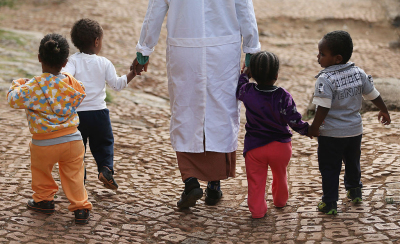A New Year’s resolution for American pastors

Each new year we take time to reflect on where we want to focus our time, money and effort in the coming 365 days. We look at what is most important and what we can accomplish. Pastors do the same, reflecting on their church’s mission and ministry goals. We ask ourselves, where can our churches make a difference for people in our community and around the world?
As we step into 2022, we need to consider the challenges facing some of our youngest worldwide. Due to COVID-19, at least 1.8 million children lost a parent, grandparent or caregiver as of May 2021, and that number continues to rise every day. It's a hidden epidemic that should grieve each of us. Additionally, studies are finding that families are struggling to care for their children with a rise in extreme poverty globally, mental health challenges, and increased stress on households.
This is a solemn reality. Vulnerable children around the world and their families are in desperate need of support. Pastors, while there are many challenges our churches are facing today and as you are considering your New Year’s resolutions this month, I urge you to add one more: commit to supporting these children. And also commit to doing it better than we have in the past. Our approaches must focus on strengthening families around the world so they can care well for orphaned and vulnerable children.
Historically, churches have rushed to build or support residential care facilities like orphanages after similar crises. My church may have responded in the same way just a few years ago. After 18 years of supporting a residential care facility for street children in Kenya, we thought we understood orphanages. We came to the realization that we didn’t.
In 2016, we began to ask questions about the effectiveness of our missions programming. Amidst that process, I sat down with a member of our congregation who asked the church to consider another partnership with an orphanage in a developing nation. He had tremendous praise for the orphanage. “Of course our children’s home is great! We’ve made it so nice, I would even send my children there.”
This moment was a wake-up call for me. While this person had the best of intentions, I realized then that our church had a lot of work to do.
This conversation brought to the surface a deep, and perhaps intuitive, understanding that all children belong in families. I humbly shared my conviction that God designed children to thrive in families, not orphanages. That conversation was a turning point. Over the last two years, our missions department has shepherded our church through the arduous transition from supporting residential care to family care for vulnerable children.
Our church used to support an orphanage in Nakuru, Kenya. Now, we partner with Agape Children’s Ministry, an organization that reunifies street children with their families in that same town. With the help of World Orphans, we also partner with a local church in Ethiopia that cares for 20 widowed mothers in their community. We’ve had the privilege of witnessing the life-changing power of family strengthening. These mothers and their children are thriving together with support.
Through these partnerships, we’ve come to understand that family separation is often preventable. And when it can’t be prevented, like in the heartbreaking case of “COVID orphans,” other forms of family care make a way for every child to grow up in the setting God designed.
When the pandemic hit, we were surprised that orphanages around the world were being shut down, including in Kenya. Members of our congregation wanted to know where the children went. The children went home to their families. The startling reality is that approximately 80 percent of children in orphanages have a living parent, and most of the remaining children have family members who are willing to care for them.
However, these families often need support. As children were sent home from orphanages to avoid the spread of COVID-19, some of these families may not have been prepared to care for them, potentially leaving the children in risky situations.
It’s a sobering truth that emphasizes the need for programs that strengthen families. However, that’s where we as Christians come in. Church leaders have an opportunity to play a key role in establishing family care as the leading solution for orphaned and vulnerable children.
As Christ-followers, we need to be confident in God’s heart for the orphaned and vulnerable as found in our Holy Scripture and be prepared to say, “thank you but no” to ministries that do not support family care for children. We must pay attention to the over 30 years of research that prove the adverse effects of residential care. We must also be willing to forsake the traditional short-term mission model of visiting orphanages to hold babies and play with children.
Pastors and elders are called by Christ to be shepherds of His flock and equip the saints for the work of ministry. We accomplish this when we are willing to repent of our past mistakes and trust a gracious Father who loves the orphaned and vulnerable more than we do. In 2022, I challenge all of you to evaluate the effectiveness of your church’s support for vulnerable children.
The pandemic has placed us at one of the most pivotal moments in history, and children who have lost parents and other caregivers to COVID-19 need our support. We can follow our tradition of supporting orphanages, or we can look to Jesus for a new vision of tending to His sheep.
Heading into this new year, my church’s focus on supporting family care has given me a renewed sense of peace in knowing that I am part of a larger movement doing the hard work of family restoration. We have a Savior who is in the business of restoration and my hope is that you will choose to be a part of it too.
Evan Baggs is the Pastor of Mobilization at Port City Community Church in Wilmington, NC. Part of Port City’s vision for mission is to care responsibly for vulnerable children and families. Evans is also an Advisory Network member for the Faith to Action Initiative, an organization that promotes family care for orphaned and vulnerable children.



























